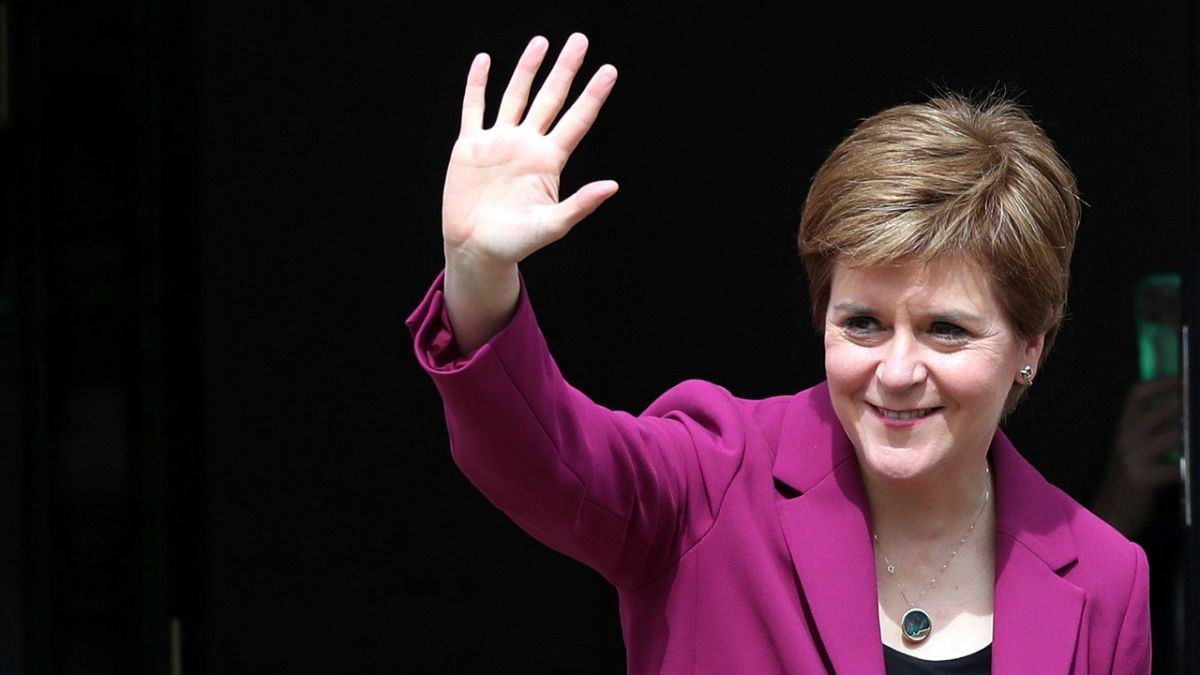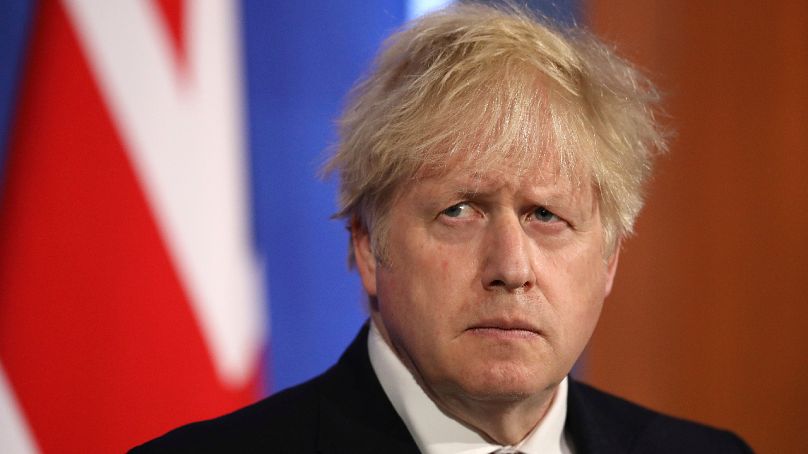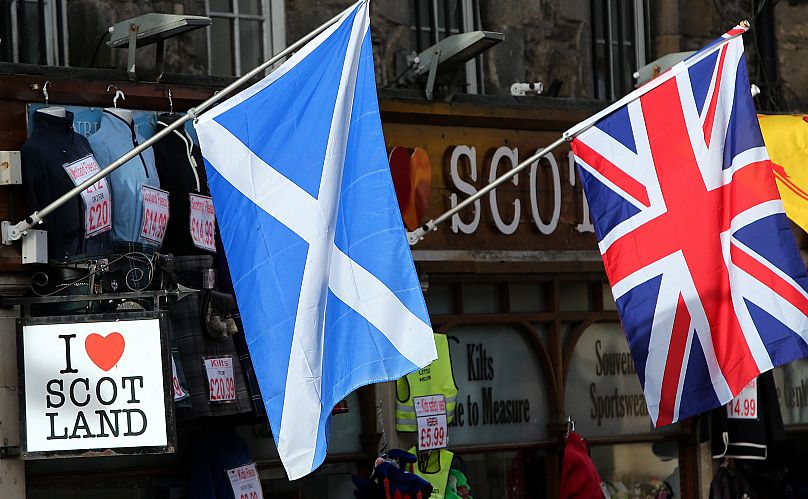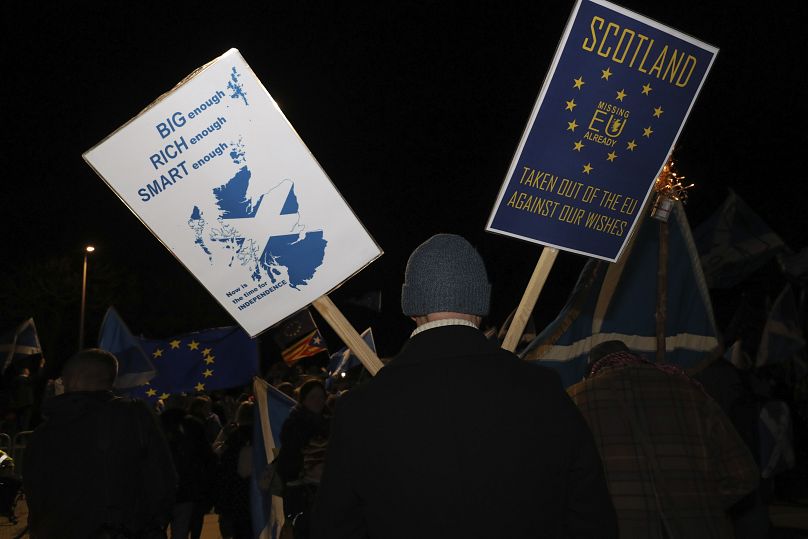SNP leader Nicola Sturgeon has vowed to push forward with a second referendum on Scottish independence from the UK once the COVID crisis is over.
The British government has been put on notice that a referendum on Scottish independence from the UK is a “matter of when not if”.
Scottish first minister Nicola Sturgeon issued the warning to British Prime Minister Boris Johnson in a phone call after her Scottish National Party (SNP) won its fourth consecutive Holyrood election.
The SNP leader said a second referendum on independence from the UK would be inevitable as soon as Scotland is on the path to recovery from the coronavirus pandemic.
Why now?
In its election platform, the SNP vowed to hold a new Scottish independence referendum if it secured another election victory.
It secured 64 of 129 seats in the Scottish Parliament, one more than in the previous election but one less than would have been needed for a majority.
But pro-independence parties still came away dominating parliament with the Scottish Greens claiming eight seats.
While Sturgeon has maintained that her government’s focus is currently on combating the coronavirus pandemic, she has vowed to see her party's promise fulfilled over the coming years.
Now, experts say, she has little choice but to deliver.
“There’s no way Nicola Sturgeon can escape it,” political scientist Sir John Curtice told Euronews.
“[The election] created a majority that is overwhelmingly in favour of independence and people who are in favour of independence are overwhelmingly in favour of holding a referendum. So there is no way she can avoid pursuing the issue."
Why are Scots split on independence?
There are a number of arguments for and against Scottish independence, and Brexit has only added fuel to the fire.
For years, those in favour of independence have argued that splitting with the EU would give Scotland more decision-making power.
But more than 62% of Scots having voted against leaving the European Union.
Now the push to rejoin the EU as an independent country has become a rallying cry for the pro-independence movement.
Other arguments in favour are that independence would give Scotland more control over the country's economy and spending, as well as over the country's national resources, namely oil.
But economic independence can be a double-edged sword.
"The argument for remaining is being very badly articulated," said political scientist and professor of Scottish Politics at the University of Aberdeen Michael Keating.
"But the arguments are almost entirely economic, [that] Scotland depends on the United Kingdom and the United Kingdom provides a larger market for Scottish goods - and that's essentially it."
There are also concerns about how Scotland would sustain its level of public spending without raising taxes, and even what currency the country would use.
Remainers also point to Scotland's historic ties with the rest of Britain.
When would a referendum take place?
Sturgeon has made clear that the timing of any future referendum will depend largely on how the coronavirus pandemic unfolds.
But the SNP leader has also said that the process could begin as soon as early next year if COVID-19 is brought under control by then.
In order to move forward with a second referendum, Scotland would first need the green light from the UK government.
In order to do that, Scotland would have to formally request a Section 30 order under the Scotland Act.
Section 30, the same mechanism used to launch the 2014 Scottish independence referendum, allows the UK government to temporarily transfer power to legislate a referendum to the Scottish parliament.
If that appeal is refused, Sturgeon has she will push forward with advancing legislation for a vote regardless and challenge the UK government to block it in the courts.
The Scottish government already introduced a draft independence Referendum Bill back in March and if the legislation was passed in parliament, it would mandate a second vote.
Sturgeon has said that she wouldn't rule out the possibility of the legislation reaching the Scottish Parliament by early next year.
If Scotland did go that route, however, the British government could take the matter to Supreme Court, which could blocked the bill from becoming law.
Will the UK government intervene?
Johnson has already made his stance clear, branding any talk of “ripping our country apart” amid the coronavirus pandemic “irresponsible and reckless”.
Inviting Sturgeon for talks following her election victory, Johnson said he believed "the people of Scotland are best served when we work together"
He has not said whether the UK government would go to the courts, but there are other options should Johnson want to play hardball.
Dr Kirsty Hughes, Director of the Scottish Centre on European Relations (SCER), told Euronews that the government could simply change the law at Westminster so it became clearly illegal to hold the referendum.
She noted, however, that in recent interviews, Cabinet Office Minister Michael Gove has made clear that the UK is a voluntary union, which should mean Scotland can leave if it wants to.
"You can see that he said that because he doesn't want the headlines in the Scottish press that this is a coerced union, but if you say it's voluntary and you don't allow a referendum, then you have to take the negative publicity," she said.
Sturgeon has already warned the UK against blocking the referendum in court, arguing that it would be “completely outrageous” for Number 10 to intervene against the will of the Scottish people.
Curtice, the political scientist, said asking Scotland to scrap plans for a second referendum would be “the equivalent of asking Boris Johnson to abandon Brexit. You can’t.”
“The crucial thing at this point for a government is not what society as a whole thinks. It’s what the people who voted you into office expect you to deliver,” he said.
Could the Scots hold Catalan-style referendum?
Scotland's push for independence has drawn comparisons to Catalonia's own fight for independence from Spain.
In October 2017, a banned independence referendum was shut down by a severe crackdown from Spanish police. Madrid later imposed direct rule on Catalonia.
Since then, there have been annual protests over the thwarted independence referendum, with the dispute representing the country's biggest political crisis in decades.
But even if the British government were to block a second referendum in Scotland, the SNP has given little suggestion that it would go down the Catalan route.
Sturgeon has maintained that she plans to follow the legal process for international recognition of Scottish independence, which would require agreement from the UK.
There is the possibility that, if shut down in court, the Scottish government could hold a "consultative" referendum.
But ultimately, Hughes said, if Scotland wants international recognition as an independent state, it needs an agreement with Britain.
"I don't think it will go the same way [as Catalonia] with Nicola Sturgeon as first minister," she said.
But equally, she does not think that the British state would respond with the same heavy-handed tactics as in Spain if Scotland did hold an illegal referendum.
"I don't think you would see the police breaking up demonstrations or see political prisoners in Scotland," she said.
Keating agreed. If Scotland did go ahead regardless, the UK would likely just ignore the result. For the Scottish government, that would amount to a political "cul-de-sac," he said.
What happens if a referendum is given go-ahead?
If a second referendum is given the green light and pushed forward, the Referendums (Scotland) Act 2020 would lay out the rules for the vote, according to The Institute for Government.
The Electoral Commission would have a statutory role, monitoring the conduct of the poll and testing the referendum question itself.
The Scottish government has already proposed that it would use the same referendum question asked in 2014: “Should Scotland be an independent country?” with "Yes" and "No" given as options.
Under the Scottish Elections (Franchise and Representation) Act 2020, anyone aged 16 and up who is a legal resident in Scotland, regardless of their nationality, and who is on the Scottish local government electoral register, would have the right to vote. That also includes prisoners serving sentences of less than 12 months under changes brought in under the 2020 legislation.
If Scots voted "Yes" in a referendum deemed legitimate by both sides, negotiations between the UK and Scottish governments would follow.
The two governments would have to work out the terms of the divorce, including the division of assets and liabilities of the UK and what the relationship between the two countries would look like.
Will history repeat itself?
Of course, the British government has allowed a referendum on Scottish independence to move forward in the past.
The UK government agreed to what was branded a “once in a generation” referendum in 2014 after the SNP won a majority in the Scottish Parliament.
In that referendum, Scots voted 55% to 45% to remain part of the UK.
Since 2016, however, after Britain voted to leave the European Union, there has been a rise in support for a second shot at leaving the UK.
In recent years, opinion polls have shown Scotland to be more or less evenly divided between support for staying with the UK and becoming independent.
In a recent poll ahead of Holyrood's election, opinion for independence was split 50-50.
However, only 42% of people surveyed in the Opinion poll for Sky News said they believed that the referendum should be held within the next five years compared to 50% who think it should not.
So, while support for independence may be split, the timing of the referendum could also be a key factor.
Curtice believes that while Sturgeon has little choice but to push forward with a referendum, it is a gamble for the SNP given the tight margins between unionists and pro-independence supporters.
"It's clear that the country is absolutely divided down the middle," he said.
Hughes thinks that the pro-independence parties would ideally want to get support for independence to at least 60% before holding a vote.
Curtice said the pandemic could give the SNP the time to do that, which is why Sturgeon has been so keen to stress that a referendum cannot be held until after the COVID-19 crisis is resolved.
"Why are the unionists so desperate to delay a referendum? "Because they know they're at risk of losing," he said.
What would the economic impact be?
Even as Sturgeon pushes forward with plans for a referendum, there are still many unknowns around what an independent Scotland might look like.
Now that the election is over, the SNP will need to start providing answers on the impact leaving the UK will have on Scots - especially when it comes to the economy.
"You need to see the SNP [...] spell out the economic case for independence," Hughes said.
"What's the argument overall for where the economy would go under independence and how would [the party] manage it?"
Right now, Hughes said, "the lack of substance is a problem. They need to do something about it."
In February, a report from the London School of Economics and City University of Hong Kong warned that Scotland’s economy could shrink by at least £11bn a year if it left the UK.
Looking solely at the impacts of increasing trading costs, researchers warned that parting ways with the UK’s economy could hit the Scottish economy two to three times as hard as Britain’s decision to leave the EU, based solely on the impacts to trade alone.
In the report, the LSE’s Centre for Economic Performance warned that the worst of the economic impact of independence would take decades to manifest.
Overall, however, the centre said that both the UK and EU would shrink Scotland’s economy by anywhere between 6.3% and 8.7%.
The rest of the UK is currently Scotland’s largest trading partner, accounting for 61% of its exports and 67% of its imports, and researchers said that would be unlikely to change post-independence.
“Changes in Scottish trade patterns following independence are likely to occur gradually, over a generation or more,” they wrote.
“Consequently, in the initial decades after independence, the rest of the UK will remain Scotland’s biggest trade partner.”
In an interview with Euronews, Professor David Bell said he believes it is too premature to be forecasting what effect there might be, because the economic conditions that independence might take place in are not yet known.
"There's a lot of unknowns," he said. "Some of them are problematic, it seems to me. But what their overall effect would be is, I think, at the moment, uncertain."
But Bell agreed that with the UK being Scotland's biggest trading partner the country could face difficulties ahead, particularly if it tried to join the EU.
"If Scotland eventually did join the EU, then the border between Scotland and England would also be a border between the EU and a third country. And if so, there would have to be regulatory checks, customs checks and all of these kinds of regulations would have to be brought in."
"That could be problematic because it could make trade difficult between Scotland and England," he said.
Another issue for Scotland, he said is that on public spending, Scotland spends more than it raises in taxes.
"Certainly, that can be fixed by changing policies that at the moment Scotland has no control over, like how much is spent on defense," Bell said.
"[But] that still wouldn't be enough to affect the public spending deficit," he cautioned, however. "So then, there's a big issue about the borrowing and whether the newly independent Scotland could borrow and on what terms it could borrow from the market."
The third issue for Scotland is what currency it would use if residents voted in favour of independence.
Recently, Sturgeon said the country would likely stick with the British pound for some time before moving over to its own national currency.
If it were to join the EU, Bell said he believed that would be a necessary step.
"I don't think the EU would be willing to accept Scotland moving from having Sterling as its currency directly into the EU and making a commitment to adopt the Euro," he said.
"It would have to have its own currency during that interim period after leaving the UK but before joining the EU.`"
How soon could Scotland rejoin the EU?
The SNP has vowed to look to rejoin the EU "as soon as possible".
In its manifesto, the party maintains that the "best way to build a more prosperous and equal Scotland is to be a fully independent member of the EU".
"The SNP believes that EU membership delivers many social, economic and cultural benefits for individuals, businesses and communities across Scotland," it says.
While the SNP acknowledges that "Brexit undoubtedly changes the way that Scotland engages with the EU," it says "it will not change the EU’s importance to Scotland, nor our commitment to rejoining the EU as soon as possible."
"By rejoining the EU we will create jobs and regain full access to the European Single Market, which is seven times the size of the UK," the SNP states.
Keating said he believes an independent Scotland could join the EU with ease, asserting "it could be fairly quick because Scotland only recently left the single market just a few months ago and it meets all the criteria for succession into the EU."
Noting the drawn-out process some EU candidate countries have faced, including Serbia, which has struggled to push its application forward due to its strained relationship with Kosovo, Keating said Scotland's case is "not like countries that have never been in the EU and are trying to get in".
"They have to go through a whole series of chapters of meeting the criteria. Scotland already meets that criteria, so it could be a fairly swift process," he said.
Of course, Keating acknowledged that there would still be some questions, such as whether Scotland would commit to using the Euro and how it would negotiate its relationship with the UK.
And given the uncertainty around when a referendum could take place, Hughes said that even if a vote were to be held in, say, 2023 and Scots voted "yes" to independence, EU membership could still be some years away.
"[Sturgeon] has talked about independence in 2026. From the analysis I've done, I would think [Scotland] could be back in the EU by 2030," she said.
Ultimately, she said: "None of this is happening overnight. The wheels won't turn as fast as some would like them to."
Every weekday, Uncovering Europe brings you a European story that goes beyond the headlines. Download the Euronews app to get a daily alert for this and other breaking news notifications. It's available on Apple and Android devices.




